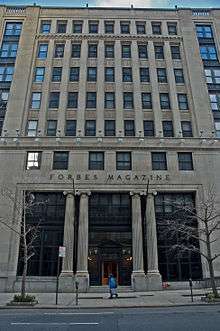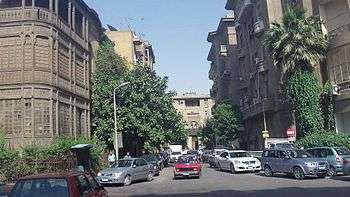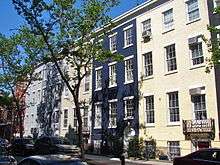Juliette Rossant
| Juliette Rossant | |
|---|---|
| Born | New York City |
| Citizenship | American |
| Alma mater | Johns Hopkins University, Dartmouth College |
| Occupation | Author, journalist, poet |
| Years active | 1987–present |
| Employer | Forbes, Simon & Schuster |
| Notable work | Super Chef (book), Super Chef (online magazine) |
| Parent(s) | James Rossant, Colette Rossant |
| Relatives | John Rossant, Susie Orbach |
| Family | Pallache family |
| Website |
julietterossant |
Juliette Rossant (born 1959) is an American author, journalist, and poet, best known for her writings about top-grossing celebrity chefs about whom she first wrote for Forbes magazine and for whom she has defined (if not coined) the term super chef, also the title of her first book and of her online magazine. She is also member of the Pallache family.
Background
Born in New York City, Rossant is the daughter of New Yorker James Rossant, architect and designer of Reston, Virginia, and Colette Rossant, a cookbook author and food writer.
Rossant grew up on Sullivan Street in Greenwich Village. After graduating from St. Ann's School in Brooklyn,[1] She attended Dartmouth College[2] and then the Johns Hopkins University, where she studied Creative Writing.[3]
She started publishing poems in Extensions literary magazine when she was 14 years old.[4] At Dartmouth, she co-founded The Stonefence Review literary magazine as an alternative to the highly conservative Dartmouth Review.[5] She studied poetry under Richard Eberhart and Kenneth Koch.
Career
Overseas

Rossant began work in Journalism while living in Istanbul in the late 1980s. She continued as a journalist while based in Paris, Moscow, and Jeddah, writing for newspapers and magazines (including Business Week). Her reportage included the Kurds in Northern Iraq during the Gulf War, fighting between Armenians and Azeris in Nagorno-Karabagh, and developments in the oil industry in Central Asia and the Middle East.
Forbes

Returning to the U.S., Rossant joined Forbes and Forbes Global to write on international business including the Forbes annual, global Billionaires List. Because of her Middle East experience, she covered the "Africa and Middle East" sections of that list every year with Forbes.[6][7][8][9][10][11][12][13][14]
Rossant also started the Celebrity Chefs column in the Forbes annual Celebrity 100 issue, which she wrote for three years.[15][16][17]
Super Chef
- Book: Simon & Schuster published Rossant's book Super Chef (Free Press imprint), based on a specific definition she developed from her work at Forbes.[18] The book profiles six "super chefs": Wolfgang Puck, Charlie Palmer, Todd English, Mary Sue Milliken and Susan Feniger (AKA the "Too Hot Tamales"), and Tom Colicchio.[19] The book was nominated by Fast Company magazine for best book.[20] Several cooking schools for chefs have used the book as a textbook.
- Magazine: Rossant continues to track the development of super chefs in Super Chef, online magazine by the same name. In 2005, the magazine championed the White House's selection of the first woman executive chef and then predicted the First Lady's choice of Cristeta Comerford.[21]
Other
Rossant has consulted to a number of companies on branding issues related to super chefs.
Rossant has become an expert, city by the Newsweek, New York Daily News,[22][23][24] Baltimore Sun, Brand Channel, and Gastronomica. She has lectured at the Culinary Institute of America and the Institute for Culinary Education. She has also contributed to publications, from Portfolio[25] to Saudi Aramco World.[26][27]
She also continues to write books.
Personal

Rossant traces her maternal line back to the Pallache/Palacci family, Sephardic Jews who moved from Spain to Morocco, the Netherlands, Italy, Turkey, and Egypt.[28] One ancestor, Samuel Pallache, served as dragoman in concluding a treaty between Morocco and the Netherlands (then a young Dutch Republic) in 1608. Several were "grand rabbis" in 19th Century Smyrna (Izmir): Haim Palachi (Haim Palacci, Hayyim Pallache), Abraham Palacci (Avraham Pallache), and Rahamim Nissim Palacci.[29] Beth Hillel Synagogue (Turkish Bet-Ilel Sinagogu) in Izmir, stands in the former home of Avraham Palache.[30] Great-grandfather Vita Palacci (born in Izmir ~ 1863) owned lemon perfume factories in Upper Egypt.[31] In 1897, he founded the store "Palacci Menasce et Fils"[32] (known in Egyptian Arabic as Balatshi) on Bayn Al-Nahdain Street in the Muski district of Cairo. By 1909, "Palacci" had become a full-fledged department store under the name "Palacci Fils, Haim et Cie" and comparable to Cairo's branch of Bon Marché: "a three-storey, 1,200-square-meter store, employing 20 office clerks and 120 salespeople in at least thirteen departments, and was 'doing a large share of the wholesale and retail trade in Egypt and the Soudan'."[33][34] After World War I, he bought one of five new villas in Garden City, Cairo, which replaced the Hotel Ritz Cairo (demolished 1905).[35] The Palacci family were associated with the Sha'ar Hashamayim Synagogue (Cairo) on Adly Street in downtown Cairo and were one of many families who contributed to its maintenance.[36] Vita's son Isaac, a commercial director who sourced items for the store all across the Mediterranean, met and married Marceline Bémant in Paris. Later, Rossant's parents also met in Paris and came to live in America in the 1950s.[31]
She traces her paternal line back to Warsaw and Seirijai, the latter in Lithuania just across the Polish border.
Works
- Super Chef (New York: Free Press 2004)
- Articles in Forbes[37]
- Articles in Business Week[38]
See also
- Celebrity chefs
- Simon & Schuster
- Forbes
- Business Week
- St. Ann's School
- Dartmouth College
- Johns Hopkins University
- Richard Eberhart
- Kenneth Koch
- Cristeta Comerford
- James Rossant (father)
- Colette Rossant (mother)
- Susie Orbach (cousin)
- Samuel Pallache (ancestor)
- Haim Palachi (ancestor)
- Abraham Palacci
- Rahamim Nissim Palacci
- Pallache family
- Pallache (surname)
- Rossant (surname)
References
- ↑ "The Growing Shelf". St. Ann's School. Archived from the original on May 29, 2009. Retrieved February 16, 2010.
- ↑ "Mini-Reunions". Dartmouth Class of '81. Archived from the original on May 26, 2011. Retrieved February 16, 2010.
- ↑ "Alumni News". Johns Hopkins Magazine. Retrieved February 16, 2010.
- ↑ "Extensions 8". JulietteRossant.com. Archived from the original on October 29, 2005. Retrieved February 16, 2010.
- ↑ "Stonefence Review". JulietteRossant.com. Retrieved February 6, 2010.
- ↑ "Middle East & Africa". Forbes. June 7, 1998. Retrieved February 16, 2010.
- ↑ "Turkey's Tire Queen". Forbes. May 7, 1999. Retrieved February 16, 2010.
- ↑ "Born Again Turk". Forbes. March 7, 2000. Retrieved February 16, 2010.
- ↑ "Your Field, Your Dreams". Forbes. June 15, 1998. Retrieved February 16, 2010.
- ↑ "Money Men: Take the off-ramp". Forbes. May 18, 1998. Retrieved February 16, 2010.
- ↑ "Princes of Egypt". Forbes. March 22, 1999. Retrieved February 16, 2010.
- ↑ "Under African Skies". Forbes. February 4, 2001. Retrieved February 16, 2010.
- ↑ "Gates Eyes the Middle East". Forbes. January 4, 2002. Retrieved February 16, 2010.
- ↑ "Another Look". Forbes. May 7, 1999. Retrieved February 16, 2010.
- ↑ "Dough Boys". Forbes. March 22, 1999. Retrieved February 16, 2010.
- ↑ "Chefs du Buck". Forbes. March 20, 2000. Retrieved February 16, 2010.
- ↑ "High-Class Cookers". Forbes. March 19, 2001. Retrieved February 16, 2010.
- ↑ "Juliette Rossant". Simon & Schuster. Retrieved February 16, 2010.
- ↑ "Super Chef". Simon & Schuster. Retrieved February 16, 2010.
- ↑ "June's FC Readers' Choice Awards". Fast Company. Archived from the original on September 6, 2012. Retrieved February 16, 2010.
- ↑ "White House Chef: Close to the Bone". Super Chef. Archived from the original on September 5, 2010. Retrieved February 16, 2010.
- ↑ Wharton, Rachel (September 18, 2006). "Cooking Cuties". New York Daily News. Retrieved May 7, 2010.
- ↑ McAuliff, Michael (August 15, 2005). "New 1st Lady of Kitchen at White House". New York Daily News. Retrieved May 7, 2010.
- ↑ Wharton, Rachel (February 9, 2005). "Celeb Chef Now Radio Turn-On for Women". New York Daily News. Retrieved May 7, 2010.
- ↑ Rossant, Juliette (April 16, 2007). "Easton's Eden". Portfolio. Retrieved May 7, 2010.
- ↑ Rossant, Juliette (September–October 2005). "The World's First Soft Drink". Saudi Aramco World. Retrieved May 7, 2010.
- ↑ Rossant, Juliette (November–December 2003). "Lights, Camera – Cook!". Saudi Aramco World. Retrieved May 7, 2010.
- ↑ "Palache". Jewish Virtual Library. 2008. Retrieved 29 August 2016.
- ↑ "Smyrna". Jewish Encyclopedia. 1907. p. 417. Retrieved 29 August 2016.
- ↑ "Beit Hillel Synagogue". Izmir Jewish Heritage. 1907. Retrieved 29 August 2016.
- 1 2 Rossant, Colette (2004). Apricots on the Nile. Atria. ISBN 0-609-60150-4.
- ↑ Japan Weekly Mail. Yokohama: (unknown). 1904. pp. 359). Retrieved 29 August 2016.
- ↑ Reynolds, Nancy (2012). A City Consumed: Urban Commerce, the Cairo Fire, and the Politics of Decolonization in Egypt. Stanford University Press. pp. 54–55 (prominence, Bon Marche), 61–62 (founding, size). Retrieved 29 August 2016.
- ↑ Special Consular Reports. U.S. Government Printing Office. 1915. pp. 180). Retrieved 29 August 2016.
- ↑ Raafat, Samir (6 August 1998). "Garden City: A Retrospective, Part I". Retrieved 29 August 2016.
- ↑ Rafaat, Samir. "Roll-Call of Contributors to the Construction/Maintenance of the Chaar Hachamaim (Adly Street Synagogue)". Historical Society of Jews From Egypt. Retrieved 8 September 2016.
- ↑ "Forbes". JulietteRossant.com. Retrieved 16 December 2016.
- ↑ "Forbes". JulietteRossant.com. Retrieved 16 December 2016.
External links
- Super Chef Magazine
- Author at Simon & Schuster
- JulietteRossant.com
- Forbes Magazine (Rossant's articles)
- Business Week Magazine (Rossant's articles)
- Saudi Aramco World Magazine (Rossant's articles)
- The Stonefence Review
